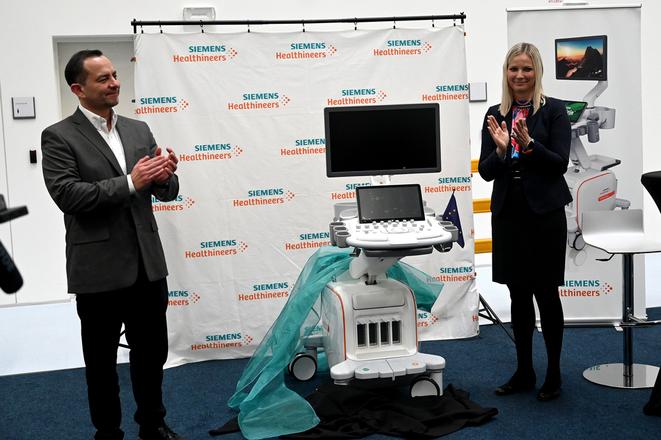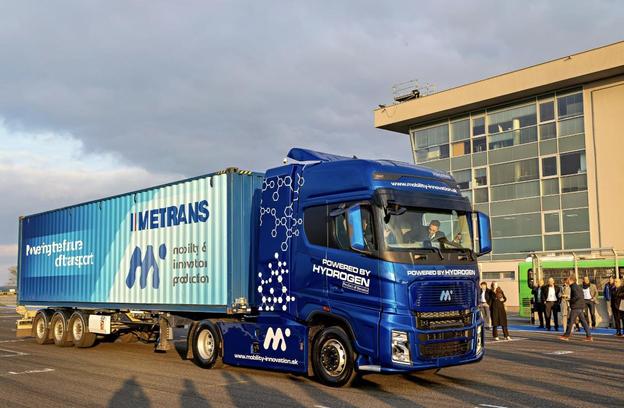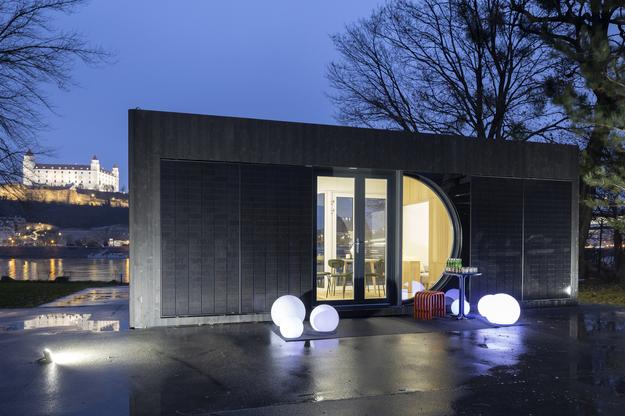As the car manufacturing industry grapples with the transition to e-mobility, Slovak experts are making strides in developing state-of-the-art technologies. Štefan Klein is advancing his second flying car model, the AirCar, while the Slovak technology company Mobility & Innovation Production (MIP) has collaborated with Turkey-based Ford Trucks to create a hydrogen-powered truck. However, Slovak innovation extends far beyond the automotive sector. In Košice, Siemens Healthineers Slovakia has developed and manufactured Europe’s only ultrasound device featuring an integrated AI button, streamlining cardiovascular diagnostics. Meanwhile, young Slovak engineers are leveraging AI to help companies reduce energy costs by analysing machine-specific consumption and driving digitalisation. Additionally, developers of off-grid micro-houses have introduced a new model designed for permanent, sustainable living.
Artificial intelligence, made in Košice
The first ultrasound machine with integrated artificial intelligence manufactured in Slovakia – also the first in Europe – has been created in Košice, eastern Slovakia. This advanced device streamlines the diagnosis of cardiovascular diseases and greatly simplifies the work of cardiologists. The ultrasound device uses artificial intelligence to quickly diagnose heart disease in detail.
“Its uniqueness lies in the functionality where artificial intelligence is incorporated,” Katarína Zidorová, director of the Siemens Healthineers Slovakia plant, told the TA3 newswire.
The measurements are automatic, relatively accurate and speed up the examination process.
“Basically, by pressing one button, within a few seconds we are shown the parameters necessary for the diagnosis of various diseases,” explained Gabriel Valočík, head of the Eastern Slovak Institute of Heart and Vascular Diseases (VÚSCH). A single button offers access to more than 5,600 measurements. The device can analyse 12 different heart sections with 99 percent accuracy.
The device helps in both diagnosis and in the procedures themselves. The involvement of artificial intelligence in ultrasound examinations was preceded by many years of collecting various data. “For this we have a database of various data or images of patients from all over the world,” said Peter Valo, software engineer, Siemens Healthineers Slovakia. “Then doctors have to annotate the machine, or teach it how to work, and that takes a really long time.” AI takes an advisory role. The responsibility for the correctness of the diagnosis still lies with the doctor. “It’s always the doctor’s job to determine the diagnosis and the next course of action,” adds Valočík. By speeding up examinations, AI can alleviate the shortage of specialist doctors, as cardiovascular diseases are affecting younger and younger patients. “Even 30 – to 40-year-olds are having heart attacks,” explained Valočík. The device was developed in collaboration with Slovak doctors, and its development took almost four years. More than a hundred experts participated in the project. Thanks to this, Slovakia has pushed the boundaries of ultrasound technology. The production of this technology in Košice gives Slovakia the advantage of faster access to the European and other markets, which moves us closer to the global market, Zidorová noted for Kosicak.sk.
Developers are now working on new versions and improving the results of artificial intelligence.
Digitalisation is a way to lower the cost of energy
Daitable, a startup helping companies to save energy, can boast, among other things, of winning the BMW Innovation Award 2023, the Slovak Startup Cup 2023, and the INQb Startup Pitch 2023, along with the Warper Startup Awards Emerging Innovator Winner 2024. And the three founders have already managed to win their first customers, including Agrokomplex, Vegum and DMC.
“I was conducting market research, asking companies what problems they were facing. They were worried about high energy prices. They wanted to optimise them and they didn’t know how,” Šimon Staňo, CEO of Daitable, told the Sme daily. “They didn’t have the data to perform the necessary analysis. That’s how our product was born.” Up to 70 percent of companies still have analogue meters, yet many of them realise that digitalisation is inevitable. “They try to save energy by analysing the consumption of the whole factory based on bills and transcribing the numbers from their meters,” Staňo told the startitup.sk website. “But then they lack data accuracy. Moreover, [the data] come in late, so production cannot adapt flexibly to what is happening on the energy market,” said Staňo, adding that, for example, excessive power consumption can also signal a machine fault that can be caught in time. Artificial intelligence combined with the smart metering of energy consumption at the level of each production machine enables more efficient production management and thus significant savings for industrial enterprises.
“We offer not only digital meters, but also data analytics, forecasting... The market is in favour of this and we are getting a positive response,” said Staňo. There is also an opportunity for Daitable to build battery energy storage. For example, manufacturing companies can follow Daitable’s predictive algorithm to determine with 98 percent accuracy when energy will be most expensive and, conversely, cheapest during the day. During times of expensive energy, the business can consume the supply from the batteries; conversely, during times of cheap energy, the business would recharge its batteries.
Slovakia debuts its first hydrogen truck
The Slovak technology company Mobility & Innovation Production (MIP) unveiled the first Slovak hydrogen truck at the motor racing facility Slovakia Ring in Orechová Potôň, western Slovakia, on November 15. The truck is built on the Ford F-Max platform with the support of Ford Trucks and is approved for the European market. While it utilises breakthrough technologies that have not yet been integrated into vehicles available on the market, four hydrogen tanks give it a range of up to 750 km per top-up, cargomagazin.sk wrote.
“The first hydrogen truck with successful homologation tests in Europe is proof of what the human mind can achieve when combined with the power of teamwork,” said Pavel Čulík, the managing director of the Slovak startup, which is focused on the research and development of emission-free propulsion systems for various vehicles. “It’s a victory comprised of courage, ingenuity and cooperation.” Successful homologation tests mean that the truck has been tested and certified to comply with the safety, environmental, and technical standards required by regulatory authorities in a particular country or region, in this case the EU.
The hydrogen truck, which is powered by a 540-kW electric engine, is capable of towing a trailer with a total weight of 45 tonnes.
“This moment is proof that our country has the potential to come up with new developments in the field of sustainable and innovative technologies, not only at the European level but also at the global level,” said Szabolcs Hodosy, state secretary (i.e. deputy minister) at the Economy Ministry, at the unveiling ceremony. Hodosy noted that in recent years Slovakia has been promoting hydrogen technologies and hydrogen could be an important source of energy for the future. However, there are still open questions in the development of the technology.
“That is why I’m pleased that also in Slovakia we are pushing the boundaries of what is possible,” he said. “The development in this area will probably depend on the application of new technologies in practice, and also on the ability of the infrastructure to adapt to the new energy source.” A memorandum of understanding was also signed with two major potential customers – Metrans and Waberer’s – as part of the vehicle’s presentation. Both companies plan to test the truck in real-world operation, and are considering adding the vehicle to their fleets in the future.
MIP worked with the Turkey-based truck manufacturer Ford Trucks, on whose platform the truck is based, to develop the hydrogen truck. “There are various projects on the market nearly every day to develop trucks with alternative propulsion, but we have brought this project to a successful conclusion,” said MIP CEO János Onódi, as quoted by cargomagazin.sk.
Slovaks develop micro-houses for off-grid living
Five years ago, people passing through New York City’s Times Square had the opportunity to check out the eggshaped micro-house Ecocapsule, designed by a Slovak company. It was displayed in the square as part of the NYCxDESIGN 2019 event that celebrated the world of design and showcases. The architectural wonder even won the Health + Wellness category. In early December the company introduced, in a world premiere, its new model, the Ecocapsule Box, suitable for permanent off-grid living.
It will be half the price of the egg-shaped micro-house. “The price should be around €55,000,” the founder of the company, Tomáš Žáček, confirmed to the Denník N daily.
He believes the box will attract “a much larger group of people” than the eggshaped model and will make Ecocapsule profitable as early as next year.
While the “eggs” are more for temporary housing, the boxes can also be used year-round, according to Žáček. “The boxes don’t need to be plugged into networks. We are counting on the fact that people will place them on land that can not normally be built on. Thanks to this, the box and the land could be cheaper than a one-room apartment in a new building in Bratislava,” he said.
Even the sky is not the limit for designer Klein
Jean-Michel Jarre, the godfather of electronic music and a technological innovator, became the world’s first passenger to take off in the AirCar, a flying car developed by Štefan Klein, in early April. “The technology we once dreamed of from the future is becoming a reality,” Jarre wrote on social media, adding that it was like being in a Jules Verne book, but for real. “One second you are speaking to the driver, and the next, you are up there in the air – an amazing experience!” Jean-Michel Jarre completed two flights in the AirCar at Piešťany International Airport, western Slovakia.
Štefan Klein, its inventor and pilot, expressed his pride at Jarre becoming the inaugural passenger on the groundbreaking aircraft, which can transform from a car into a plane within two minutes, and has a maximum speed when airborne of 190 km/h. “From dreams to reality, we have taken flight together with Jean-Michel, opening a new era of transportation with a touch of magic,” said Klein. Earlier in April, Klein’s company Klein Vision sold the licence to produce the car to Chinese investor Hebei Jianxin Flying Car Technology. The exact value of the transaction has not been revealed, but a seven-figure sum is rumoured. Klein Vision says the funding will enable it to prepare the AirCar more quickly for production for the European and US markets, a process which could get underway next year.
The AirCar, which received its Certificate of Airworthiness in January 2022, is Štefan Klein’s second flying car project. Klein started to develop the Air- Car after selling his share in AeroMobil, where he had developed his first flying car model. AeroMobil went bust in 2023, after 12 years of existence, when investors refused to put any more money into the project.




